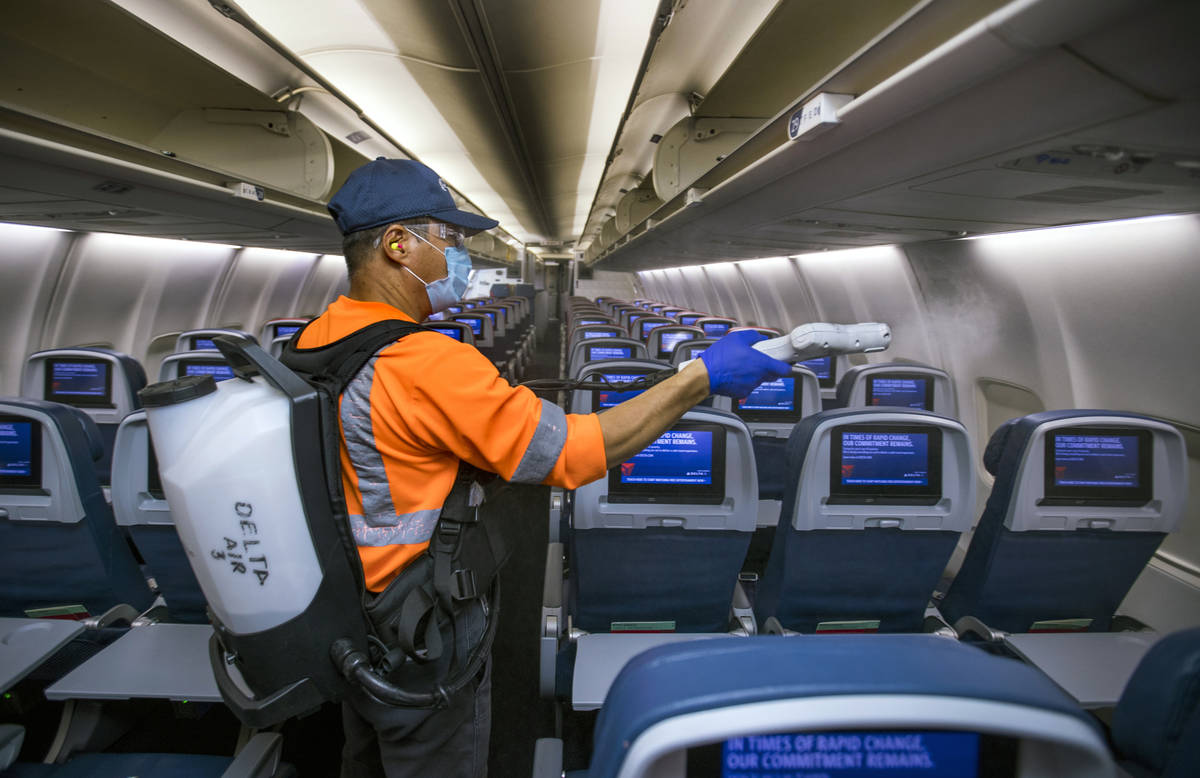Delta, United take steps at McCarran to ensure passengers’ safe travel

With air travel seeing a slight uptick in passengers, U.S. airlines are doubling down on their safety and cleaning measures to protect against the spread of the coronavirus.
Delta Air Lines, which expects to have 33 daily flights out of Las Vegas next month, on Wednesday demonstrated the COVID-19 mitigation procedures that begin as soon as passengers walk through the doors at McCarran International Airport.
“Delta’s focus over the past several months has been in restoring our customers’ confidence in the travel experience,” said Sandy Gordon, senior vice president of airport operations for Delta. “From the curb to the baggage claim, every element of travel has been part of the focus for us.”
But Delta isn’t the only airline ramping up its safety measures, as United Airlines is set to introduce antimicrobial-spraying droids at McCarran by the end of the year.
The droids will spray an antimicrobial mist that will coat surfaces and inhibit the growth of microbes for about seven days, United announced last week.
“This long-lasting, antimicrobial spray adds an extra level of protection on our aircraft to help better protect our employees and customers,” said Toby Enqvist, United’s chief customer officer.
Airline passenger volume has been slowly inching up since the city was essentially shut down for 78 days beginning in March. McCarran saw 1 million passengers in June and 1.6 million passengers in July, the latest figures available.
Delta’s procedures
Delta’s layered approach includes self-check-in kiosks at the ticketing area that are sanitized several times per day.
If a traveler needs an agent’s assistance, there are social distancing markers on the ground to ensure guests maintain safe distances while in line. Plexiglas dividers also are installed at counters, separating employees and passengers while they conduct business. And if a customer isn’t already wearing a mask, he or she will be provided one, as masks are required at McCarran.
The goal, Gordon said, is “ensuring surfaces are cleaned and disinfected. Also ensuring space is part of the efforts and you notice that through the airports and airplanes.”
In between the ticketing area and the gate, McCarran and the Transportation Security Administration take over the safety procedures.
Signage, social distancing markers and hand sanitizing stations are located throughout McCarran’s terminals.
Once Delta passengers arrive at their departure gate, they’ll find the waiting area has every other seat blocked off to promote social distancing. The waiting areas are sprayed daily with an electrostatic disinfectant.
All passengers traveling on Delta also will be provided safety kits that include a mask and packets of hand sanitizer upon boarding their flights.
Before guests board, the plane’s cabin is disinfected with an electrostatic sprayer between each flight.
To allow for social distancing on board, Delta has committed to having the middle seat blocked off until at least January.
Gordon said most of the safety protocols being introduced will stick around and become commonplace in the future.
United’s droids
United’s antimicrobial spray is being tested at Chicago’s O’Hare International Airport and is expected to be rolled out to McCarran and the nearly 200 airports the airline serves by the end of the year.
“As part of our layered approach to safety, antimicrobials are an effective complement to our hospital-grade HEPA air filtration system, mandatory mask policy for customers and daily electrostatic spraying,” Enqvist said.
The spray bonds to surfaces and creates a barrier that resembles microscopic pins that puncture microbes’ cell walls and membranes upon contact.
United said it plans to apply the antimicrobial to aircraft overnight once a week. Airline staff will continue to use electrostatic spray disinfectant in aircraft cabins before the majority of United’s departures.
Contact Mick Akers at makers@reviewjournal.com or 702-387-2920. Follow @mickakers on Twitter.